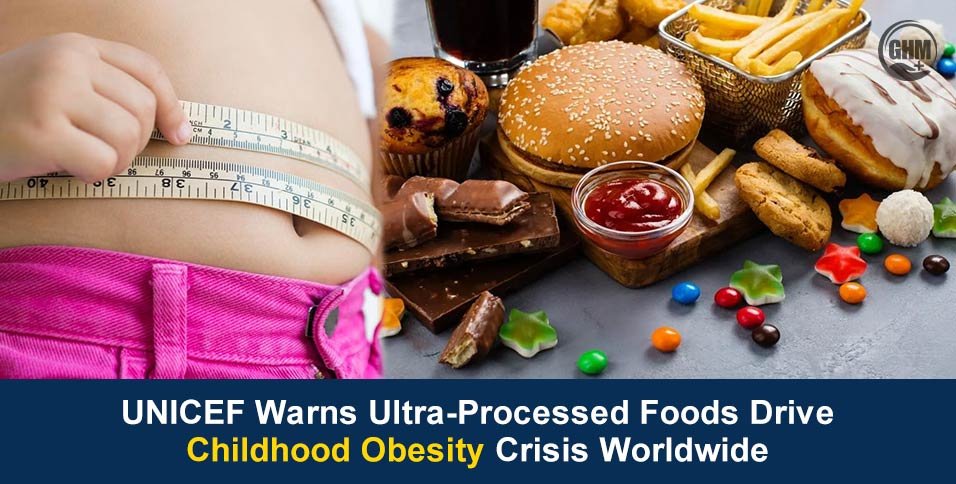For the first time in history, there are more children worldwide who are obese than underweight, according to a major study by UNICEF. The report revealed that one in ten children and adolescents aged 5-19, approximately 188 million young people, are living with obesity.
Researchers warn that this crisis is being fueled by a rapid global shift from traditional, nutrient-rich diets to ultra-processed foods that are high in calories, sugars, and unhealthy fats but low in essential nutrients.
“This is not just a health issue, it’s a societal issue,” said Catherine Russell, Executive Director of UNICEF. “Children’s diets are increasingly shaped by industries that prioritize profit over public health.”
Effects Of Ultra-Processed Foods
Ultra-processed foods include items like packaged snacks, sugary drinks, instant noodles, and frozen ready-to-eat meals. These products are designed to be cheap, convenient, and addictive, making them appealing to families, especially in urban areas and low-income communities.
Factors Driving Popularity of Ultra-Processed Foods
- Affordability: They are often cheaper than fresh produce and whole foods.
- Aggressive Marketing: Targeted ads, especially on social media, make these foods attractive to children.
- Urban Lifestyles: Busy parents rely on quick and convenient food options.
- Global Expansion: Multinational food companies have expanded heavily into developing nations.
From Undernutrition to Overnutrition
For decades, global health campaigns focused on combating malnutrition and hunger. While undernutrition remains a serious issue in certain regions, the balance has shifted. Many countries are now experiencing a double burden of malnutrition, where underweight children and obese children exist side-by-side.
Examples of Double Burden
- Africa: In some African nations, rates of childhood obesity are climbing even as millions of children still face food scarcity.
- Asia: Rapid urbanization has led to fast-food chains and processed snacks replacing traditional meals.
- Western Nations: Ultra-processed foods dominate diets, causing childhood obesity to reach record highs.
This global trend highlights how dietary quality, not just quantity, is critical to children’s health.
Health Consequences of Childhood Obesity
Childhood obesity is not just about appearance. It has serious long-term health consequences.
- Increased risk of type 2 diabetes, once considered an adult-only disease.
- Higher chances of developing heart disease and high blood pressure later in life.
- Negative effects on mental health, including low self-esteem and depression.
- Greater likelihood of remaining obese in adulthood, creating a cycle of health issues.
UNICEF’s Call to Action
UNICEF is urging governments to take bold measures to protect children from the harmful effects of ultra-processed foods.
Proposed Actions:
- Policy Changes: Ban or limit marketing of unhealthy foods to children.
- Nutrition Education: Promote healthy eating habits in schools and communities.
- Food Industry Regulation: Prevent food corporations from influencing policy decisions.
- Improved Food Access: Make fresh, nutritious food more affordable and available.
UNICEF emphasizes that governments must act independently of the powerful food and beverage industry, which has been accused of lobbying against health-focused regulations.
Family’s Responsibility
While governments work on systemic change, families can take steps to reduce their children’s exposure to ultra-processed foods:
- Cook fresh meals at home whenever possible.
- Encourage water instead of sugary drinks.
- Teach children to read nutrition labels.
- Limit screen time to reduce exposure to junk food ads.
- Introduce traditional, wholesome foods early in a child’s life.
Small, consistent changes can make a significant difference in a child’s long-term health.
Global Challenge Needs Urgent Action
The rise of ultra-processed foods is reshaping childhood health worldwide, creating a future where obesity-related illnesses could overwhelm healthcare systems.
UNICEF’s latest findings serve as an important reminder that children’s health is a shared responsibility, involving families, governments, educators, and industries.
“We urgently need policies that support parents and caretakers to access nutritious and healthy foods for their children,” said Russell.
Conclusion
The global childhood obesity crisis is a wake-up call. The dominance of ultra-processed foods in modern diets poses a grave threat to the physical and emotional well-being of young people. By combining policy reform, education, and individual action, the world can reverse this trend and protect the next generation from preventable health issues.













